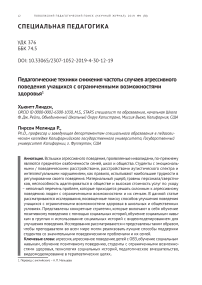Педагогические техники снижения частоты случаев агрессивного поведения учащихся с ограниченными возможностями здоровья
Автор: Хьюитт Линдси, Пирсон Мелинда Р.
Журнал: Поволжский педагогический поиск @journal-ppp-ulspu
Рубрика: Специальная педагогика
Статья в выпуске: 4 (30), 2019 года.
Бесплатный доступ
Вспышки агрессивного поведения, проявляемые инвалидами, по-прежнему являются предметом озабоченности семей, школ и общества. Студенты с эмоциональными / поведенческими расстройствами, расстройствами аутистического спектра и интеллектуальными нарушениями, как правило, испытывают наибольшие трудности в регулировании своего поведения. Материальный ущерб, травмы персонала/сверстников, неспособность адаптироваться в обществе и высокая стоимость услуг по уходу - неполный перечень проблем, которые приходится решать склонным к агрессивному поведению людям с ограниченными возможностями и их семьям. В данной статье рассматриваются исследования, посвященные поиску способов улучшения поведения учащихся с ограниченными возможностями здоровья в школьных и общественных условиях. Представлены конкретные стратегии, которые включают в себя обучение позитивному поведению с помощью социальных историй, обучение социальным навыкам в группах и использование социальных историй с видеомоделированием для улучшения поведения. Исследования рассматриваются и представлены таким образом, чтобы преподаватели во всем мире могли реализовать лучшие способы поддержки студентов со значительными поведенческими проблемами и их семей.
Агрессия, агрессивное поведение детей с овз, обучение социальным навыкам, обучение позитивному поведению, студенты с ограниченными возможностями здоровья, технология социальных историй, педагогическое вмешательство, видеомоделирование в терапевтических целях
Короткий адрес: https://sciup.org/142223258
IDR: 142223258 | DOI: 10.33065/2307-1052-2019-4-30-12-19
Список литературы Педагогические техники снижения частоты случаев агрессивного поведения учащихся с ограниченными возможностями здоровья
- Bilias-Lolis E., Chafouleas S. M., Kehle T. J., Bray M. A. Exploring the utility of self-modeling in decreasing disruptive behavior in students with intellectual disability. // Psychology in The Schools. 2012. № 49 (1). P. 82 - 92.
- Chaïb L. S., Crocker A. G. The role of personality in aggressive behaviour among individuals with intellectual disabilities. // Journal of Intellectual Disability Research. 2014. № 58 (11). P. 1015 - 1031.
- Coleman J. K. A controlled evaluation of the effects of classroom coping skills training on children's aggressive and externalizing behaviors. // Dissertation Abstracts International. 2001. № 61. P. 38 - 36.
- Deckers A., Muris P., Roelofs J., Arntz A. (2016). A Group-Administered Social Skills Training for 8- to 12-Year- Old, High-Functioning Children with Autism Spectrum Disorders: An Evaluation of Its Effectiveness in a Naturalistic Outpatient Treatment Setting. Journal of Autism and Developmental Disorders, 46(11), P. 3493 - 3504.
- DSM-5 Diagnostic Criteria. (2013, July 29). Retrieved May 11, 2018. // [Электронный ресурс]. URL: https:// www.autismspeaks.org/what-autism/diagnosis/dsm-5-diagnostic-criteria (дата обращения 15.10.2019).
- Embregts P. M., Didden R., Huitink C., Schreuder N. (2009). Contextual variables affecting aggressive behaviour in individuals with mild to borderline intellectual disabilities who live in a residential facility. Journal of Intellectual Disability Research, 53(3), P. 255 - 264.
- Gull S. O. (2016). The Combined Use of Video Modeling and Social Stories in Teaching Social Skills for Individuals with Intellectual Disability. Educational Sciences: Theory and Practice, 16(1), P. 83 - 107.
- Hill A. P., Zuckerman K. E., Hagen A. D., Kriz D. J., Duvall S. W., van Santen J., Nigg J., Fair D., Fombonne E. Aggressive behavior problems in children with autism spectrum disorders: Prevalence and correlates in a large clinical sample. // Research in Autism Spectrum Disorders. 2014. № 8 (9). P. 1121 - 1133.
- Kern L., Wacker D., Mace F., Falk G., Dunlap G., Kromrey J. D. Improving the peer interactions of students with emotional and behavioral disorders through self-evaluation procedures: A component analysis and group application. // Journal of Applied Behavior Analysis, 1995. № 28 (1). P. 47 - 59.
- Laugeson E. A., Ellingsen R., Sanderson J., Tucci L., Bates S. The ABC's of Teaching Social Skills to Adolescents with Autism Spectrum Disorder in the Classroom: The UCLA "PEERS®" Program. // Journal of Autism and Developmental Disorders. 2014. № 44 (9). P. 2244 - 2256.
- Lerner J. W., Johns B. H. Learning disabilities and related disabilities: strategies for success (13th ed.). Australia: Cengage Learning, 2015.
- Matson J. L., Smiroldo B. B., Bamburg J. W. (1998). The relationship of social skills to psychopathology for individuals with severe or profound disabilities. // Journal of Intellectual & Developmental Disability. 1998. № 23(2). P. 137.
- Niccols A., Milligan K., Chisholm V., Atkinson L. (2011). Maternal sensitivity and overt aggression in young children with Down syndrome. // Brain and Cognition. 2011. № 77 (2). P. 153 - 158.
- Othman A., Ramlee F., Ghazalan S. M., Wei W. K., Shahidi R. M. Effects of a brief cognitive-behavioural and social skills group intervention for children with psychological problem: A pilot study. International Medical Journal. 2015. № 22 (4). P. 241 - 245.
- Ozdemir, S. (2008). The Effectiveness of Social Stories on Decreasing Disruptive Behaviors of Children with Autism: Three Case Studies. Journal of Autism and Developmental Disorders, 38(9), P. 1689 - 1696.
- Radley K. C., Hanglein J., Arak M. School-Based Social Skills Training for Preschool-Age Children with Autism Spectrum Disorder. Autism: The International Journal of Research and Practice. 2016. № 20 (8). P. 938 - 951.
- Radley K. C., O'Handley R. D., Battaglia A. A., Lum J. K., Dadakhodjaeva K., Ford W. B., McHugh a. B. (2017). Effects of a Social Skills Intervention on Children with Autism Spectrum Disorder and Peers with Shared Deficits. // Education and Treatment of Children. 2017. № 40 (2). P. 233 - 262.
- Scattone D., Wilczynski S., Edwards R., Rabian B. Decreasing disruptive behaviors of children with autism using social stories. // Journal of Autism and Developmental Disorders. 2002. № 32 (6). P. 535.
- Unicomb R., Colyvas K., Harrison E., Hewat S. Assessment of reliable change using 95% credible intervals for the differences in proportions: A statistical analysis for case-study methodology. Journal of Speech, Language, and Hearing Research. 2015. № 58 (3). P. 728 - 739.
- Wehby J., Symons F. Revisiting Conceptual Issues in the Measurement of Aggressive Behavior. // Behavioral Disorders. 1996. № 22(1). P. 29 - 35


